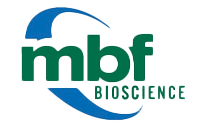We’re Kicking off a Year of Celebrations in Honor of the Computer Microscope’s 50th Anniversary
In the early 1960s, our company co-founder Dr. Edmund Glaser and his long time collaborator and friend Dr. Hendrik Van der Loos made some sketches on a paper tablecloth in the faculty dining room at John Hopkins Hospital, in Baltimore Maryland. That early diagram of a microscope included novel elements like transducers and a mechanical stage, and gave shape to their ideas about a faster way...
Read More










